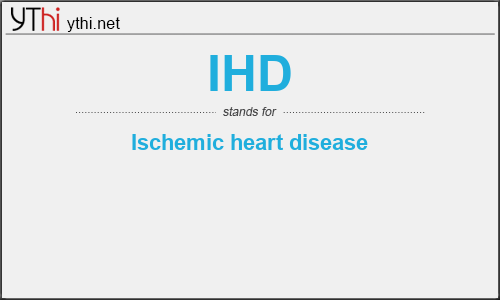What does IHD mean? What is the full form of IHD?
The Full Form of IHD is Ischemic heart disease.
Ischemia is defined as inadequate blood supply (circulation) to a local area due to blockage of the blood vessels supplying the area. Ischemic means that an organ (e.g., the heart) is not getting enough blood and oxygen. Ischemic heart disease, also called coronary heart disease (CHD) or coronary artery disease, is the term given to heart problems caused by narrowed heart (coronary) arteries that supply blood to the heart muscle. Although the narrowing can be caused by a blood clot or by constriction of the blood vessel, most often it is caused by buildup of plaque, called atherosclerosis. When the blood flow to the heart muscle is completely blocked, the heart muscle cells die, which is termed a heart attack or myocardial infarction (MI). Most people with early (less than 50 percent narrowing) CHD do not experience symptoms or limitation of blood flow. However, as the atherosclerosis progresses, especially if left untreated, symptoms may occur. They are most likely to occur during exercise or emotional stress, when the demand for the oxygen carried by the blood increases.
The discomfort experienced when the heart muscle is deprived of adequate oxygen is called angina pectoris. This is a clinical syndrome characterized by discomfort in the chest, jaw, shoulder, back, or arms that is typically aggravated by exertion or emotional stress and relieved promptly with rest or by taking nitroglycerin. Angina usually occurs in patients with CHD, but also can occur in individuals with valvular disease, hypertrophic cardiomyopathy, and uncontrolled hypertension. Infrequently, patients with normal coronary arteries may experience angina related to coronary spasm or endothelial dysfunction (Gibbons et al., 2002a).
IHD
means
Ischemic heart disease![]()
Translate Ischemic heart disease to other language.


Leave a Reply
You must be logged in to post a comment.